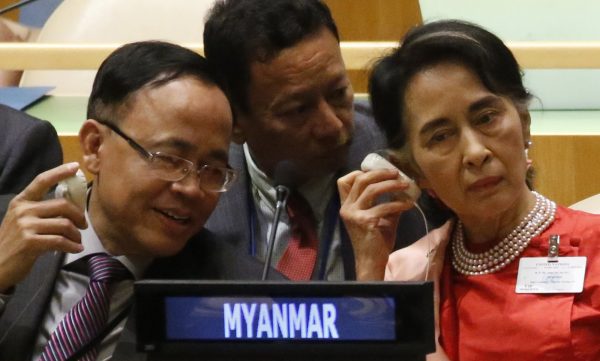and industries. Obama’s decision was applauded by many in the US business community for allowing US companies to compete on an even playing field with foreign competitors eager to invest in the rapidly growing Southeast Asian market.
The move also triggered speculation that it signalled a distinct reorientation towards Washington at Beijing’s expense. But since assuming power in April, foreign policy under Aung San Suu Kyi and the National League for Democracy (NLD) government is largely a continuation of efforts initiated by the previous military-backed Thein Sein regime — designed to diversify international partners.
While Myanmar military leaders’ motivations to construct and support the political transition process remain uncertain, the overwhelming influence of China appears to have been a primary driver. While Beijing acted as a necessary economic lifeline and diplomatic protector after Western sanctions were imposed in 1990, Chinese influence in Myanmar remains controversial.
The influx of Chinese investment and workers, the non-negotiability of deeply unpopular economic projects, and Beijing’s tacit support for some ethnic groups and armies compromised Myanmar’s sovereignty to the point that the military leadership decided drastic changes were needed. The fear of becoming a Chinese satellite was the primary catalyst for political reforms that would improve relations with the West to counterbalance Beijing’s stranglehold over the country.
Chinese leaders have been caught off guard by the scale and pace of domestic reforms and the accelerated rapprochement between the military-backed regime and Washington. The cancellation or suspension of a number of Chinese economic ventures — especially the Myitsone Dam project — was an early warning to Beijing that such endeavours would be subject to social scrutiny and not automatically accepted. As an important strategic partner for energy imports and a launching pad into Southeast Asia, the government’s cool reception of China’s regional economic endeavours further raised concerns.
Aung San Suu Kyi and the NLD’s assumption of power also cast doubt over bilateral relations. Beijing was anxious that Aung San Suu Kyi would accelerate the Tatmadaw’s westward tilt. But despite fears she would become a de facto Western ally as part of the US ‘rebalance’ and a democracy promoter, Aung San Suu Kyi has continued to pursue a careful strategy of non-alignment.
While continuing to deepen diplomatic and economic relations with the United States and the West, Aung San Suu Kyi has avoided adopting positions on divisive strategic matters such as the South and East China Sea disputes. Suu Kyi’s decision to visit China as her first foreign trip as State Counsellor — before the United States — indicates that she is keenly aware of the need to maintain relations with her country’s great power neighbour. China is Myanmar’s largest trading partner, source of aid and foreign investor. The two countries also share a porous border populated by some ethnic groups under Beijing’s influence still fighting the Tatmadaw and central government.
Maintaining good relations also offsets Western attempts to influence Aung San Suu Kyi’s domestic agenda, including issues of status and living conditions for the Rohingya — a term she has banned from government correspondence.
The military leadership has not opposed Suu Kyi’s agenda and in many ways continues to deepen cooperation with the NLD government. But their entrenched positions of power (including an effective veto over constitutional change) have not yet been directly challenged. As the political transition continues there are concerns that these issues must be addressed to achieve further progress. In pursuit of this objective, some in the West are calling for the formal establishment of military ties with the Tatmadaw to professionalise and incentivise them to further retreat politically.
Others argue that such efforts would only further entrench them politically, giving the Tatmadaw a major power ally with advanced weapons and training to counteract their historic dependence on Beijing. While forced to work with the military leadership as equals, Aung San Suu Kyi does not want their political positions legitimised in any form and may blunt the generals’ attempts to deepen relations with the United States by maintaining good relations with China herself. China, for its part, continues to deepen relations with all of Myanmar’s major political actors, including the military, but may support the NLD government more overtly if the generals are seen to shift towards the West.
Donald Trump’s recent victory calls into question Washington’s commitment to its current engagement strategy, let alone the ‘rebalance’. Even with its new civilian leadership, Myanmar is unlikely to move headlong into a new dependence relationship with the West (geopolitically or otherwise). Instead it will probably seek to establish stable ground for furthering relations with both major powers whose support and involvement will be critical in the continued reformation of the state.
Adam P MacDonald is an independent researcher based in Halifax, Canada.

